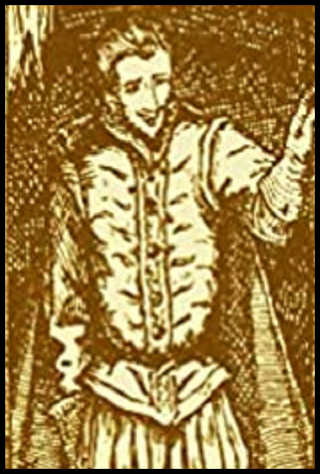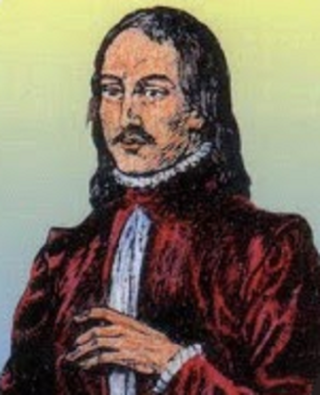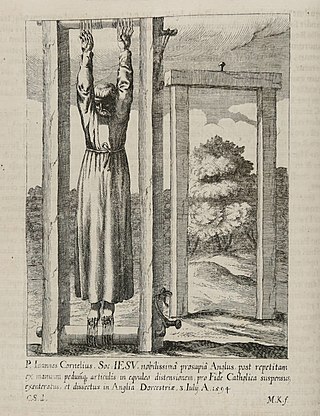
Chideock is a village and civil parish in south west Dorset, England, situated close to the English Channel between Bridport and Lyme Regis. Dorset County Council's 2013 estimate of the parish population is 550.
William Gibson was a layman from Ripon in Yorkshire, England, a member of a noble Scottish family, who was executed at York for professing the Roman Catholic faith. He is honoured as a martyr by the Catholic Church.

John Ogilvie, SJ was a Scottish Jesuit priest. For his work in service to a persecuted Catholic community in 17th century Scotland, and in being hanged for his faith, he became the only post-Reformation Scottish saint.

The Forty Martyrs of England and Wales or Cuthbert Mayne and Thirty-Nine Companion Martyrs are a group of Catholic, lay and religious, men and women, executed between 1535 and 1679 for treason and related offences under various laws enacted by Parliament during the English Reformation. The individuals listed range from Carthusian monks who in 1535 declined to accept Henry VIII's Act of Supremacy, to seminary priests who were caught up in the alleged Popish Plot against Charles II in 1679. Many were sentenced to death at show trials, or with no trial at all.

John Boste is a saint in the Catholic Church, and one of the Forty Martyrs of England and Wales.
The Dryburne Martyrs: Richard Hill, Richard Holiday, John Hogg and Edmund Duke were English Roman Catholic priests and martyrs, executed at Dryburne, County Durham, in the reign of Elizabeth I. They were beatified by Pope John Paul II in 1987.

Hugh Green was an English Catholic priest who was beatified by the Catholic Church in 1929. He was also known as Ferdinand Brooks or Ferdinand Brown.

The Venerable English College, commonly referred to as the English College, is a Catholic seminary in Rome, Italy, for the training of priests for England and Wales. It was founded in 1579 by William Allen on the model of the English College, Douai.

Irish Catholic Martyrs were 24 Irish men and women who have been beatified or canonized for both a life of heroic virtue and for dying for their Catholic Faith between King Henry VIII and Catholic Emancipation in 1829.
Robert Nutter was an English Catholic priest, Dominican friar and martyr. He was beatified in 1987.

John Cornelius also called Mohun, was an Irish Catholic priest and Jesuit born in Cornwall. He is a Catholic martyr, beatified in 1929.

Thomas Belson was an English Roman Catholic layman and martyr, beatified in 1987.

The Oaten Hill Martyrs were Catholic Martyrs who were executed by hanging, drawing and quartering at Oaten Hill, Canterbury, on 1 October 1588. The gallows had been put up in 1576. These four were beatified by Pope Pius XI in 1929.

An act against Jesuits, seminary priests, and such other like disobedient persons, also known as the Jesuits, etc. Act 1584, was an Act of the Parliament of England passed during the English Reformation. The Act commanded all Roman Catholic priests to leave the country within 40 days or they would be punished for high treason, unless within the 40 days, they swore an oath to obey the Queen. Those who harboured them, and all those who knew of their presence and failed to inform the authorities, would be fined and imprisoned for felony, or if the authorities wished to make an example of them, they might be executed for treason.

Dominic Collins, SJ was an Irish Jesuit lay brother, an ex-soldier, who died for his Catholic faith. He was beatified by Pope John Paul II, along with 16 other Irish Catholic Martyrs, on 27 September 1993.

John Arundell, of Lanherne, St. Mawgan-in-Pyder, Cornwall, was an English politician. He was a noted recusant, and a close associate of the Catholic martyr St. Cuthbert Mayne.

One Hundred and Seven Martyrs of England and Wales, also known as Thomas Hemerford and One Hundred and Six Companion Martyrs, are a group of clergy and laypersons who were executed on charges of treason and related offences in the Kingdom of England between 1541 and 1680. They are considered martyrs in the Roman Catholic Church and were beatified on 15 December 1929 by Pope Pius XI.

Thomas Bartholomew Weld (1750–1810), known as Thomas Weld of Lulworth Castle, was a member of the English Catholic gentry, landowner, philanthropist and bibliophile. He was connected to many of the leading Catholic families of the land, such as the Bodenhams, Cliffords, Erringtons, Petres and Stourtons. He proved to be a great benefactor of the Society of Jesus in England in their educational and pastoral endeavours, as timely donor of his Stonyhurst estate in 1794. He was also a benefactor to other Roman Catholic religious and clergy. He was a personal friend of King George III. His sister-in-law was Maria Fitzherbert. After the French Revolution he hosted refugee remnants of the French royal family at his castle. He was the builder, in 1786, of the first Roman Catholic place of worship in England after the Protestant Reformation.
Dorothy Arundell was an English author and Benedictine nun in Brussels. Her Catholic family's priest and three others were arrested and executed. She and her sister went to Brussels where they entered the English Benedictine convent there. She wrote a biography of the priest who was later beatified. She was a key patron of the first of the 22 English convents founded on the continent in the 1600s.















